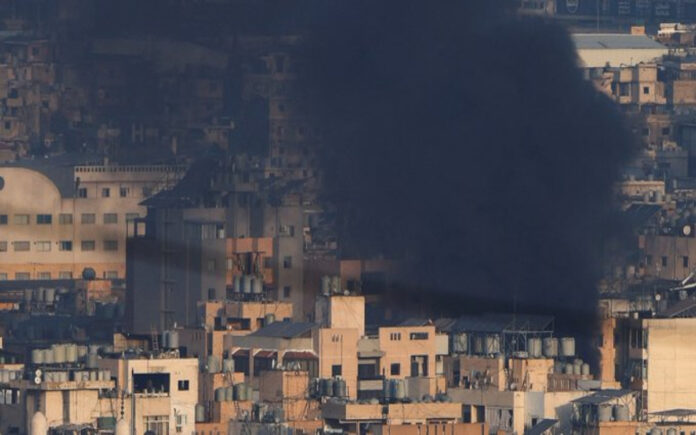Beirut: In the early hours of Wednesday morning, at least one Israeli strike targeted the southern suburbs of Beirut, according to witnesses who spoke to the international news agency Reuters. This occurred just hours after the U.S. voiced its opposition to the extent of Israeli air assaults in the city, amid a rising death toll and growing concerns about regional escalation.
Witnesses in Beirut reported hearing two explosions and seeing plumes of smoke rising from two separate neighborhoods. The strikes followed an Israeli evacuation order issued early on Wednesday, which mentioned only one building but indicated broader intentions.
In recent weeks, the Israeli military has conducted strikes in the southern suburbs of Beirut, a known stronghold of Hezbollah, without prior warnings, or providing warnings for only specific areas while targeting others more widely. The military claimed it struck an underground Hezbollah weapons stockpile in the Dahiyeh suburb.
“Prior to the strike, numerous steps were taken to mitigate the risk of harming civilians, including advancing warnings to the population in the area,” the Israeli military stated.
Israeli military evacuation orders reportedly affected more than a quarter of Lebanon, according to the U.N. refugee agency, two weeks after Israel commenced incursions into southern Lebanon aimed at pushing back Hezbollah.
Amid these developments, some Western nations have called for a ceasefire between Israel and Hezbollah, as well as in Gaza. However, the United States maintains its support for Israel, recently dispatching an anti-missile system and troops to the region.
On Tuesday, State Department spokesperson Matthew Miller conveyed U.S. concerns to Israeli Prime Minister Benjamin Netanyahu’s administration regarding the recent airstrikes. “When it comes to the scope and nature of the bombing campaign that we saw in Beirut over the past few weeks, it’s something that we made clear to the government of Israel we had concerns with and we were opposed to,” he told reporters, reflecting a more critical stance than Washington has previously taken.
The last Israeli airstrike on Beirut occurred on October 10, killing 22 people and causing the collapse of buildings in a densely populated area near the city center.
Also Read | One Year of Gaza War | War Brews Where Chaos Reigns, and Peace Thrives Where Humanity Prevails
Targets Include Leaders and Key Infrastructure
The Middle East remains tense following Iran’s missile attack on Israel on October 1, following a similar large-scale operation in April. Israel has vowed retaliation, with Iran’s allies—Hezbollah, Yemen’s Houthis, and armed groups in Iraq—launching regional attacks in support of Hamas amid the ongoing Gaza conflict, complicating efforts to reduce tensions.
Iranian Foreign Minister Abbas Araqchi is currently visiting Jordan, Egypt, and Turkey as part of Tehran’s diplomatic outreach to regional nations “to end genocide, atrocity and aggression,” as stated by the Iranian foreign ministry’s spokesperson on Wednesday.
Israel has intensified actions against Hezbollah since beginning incursions into Lebanon after targeting its leaders and commanders, including a recent strike that killed Hassan Nasrallah, the group’s veteran secretary-general, marking a significant blow to Hezbollah.
On Tuesday, Netanyahu informed French President Emmanuel Macron during a phone call that he opposed a unilateral ceasefire and expressed surprise at Macron’s proposal to hold a conference on Lebanon, according to an Israeli readout. “A reminder to the French President: It was not a UN decision that established the State of Israel but the victory that was achieved in the War of Independence…” Netanyahu’s office added in a separate statement.
The Elysee Palace did not immediately respond to a request for comment. The two leaders have previously disagreed, including on Macron’s call to halt arms sales to Israel.
As diplomatic efforts falter and reach an impasse, hostilities continue to escalate, leading to further violence and instability in the region. Despite calls for dialogue and resolution, the ongoing confrontations show no signs of abating, exacerbating the humanitarian crisis and deepening the divide between the conflicting parties.
Israeli strikes in Lebanon have reportedly resulted in at least 2,350 fatalities over the past year and nearly 11,000 injuries, as stated by the health ministry. Additionally, more than 1.2 million people have been displaced. The reported toll does not differentiate between civilians and combatants but includes hundreds of women and children, underscoring the heavy toll on Lebanese civilians as Israel seeks to dismantle Hezbollah’s infrastructure amid the ongoing conflict that reignited a year ago with Hezbollah’s rocket fire supporting Hamas at the start of the Gaza war.



